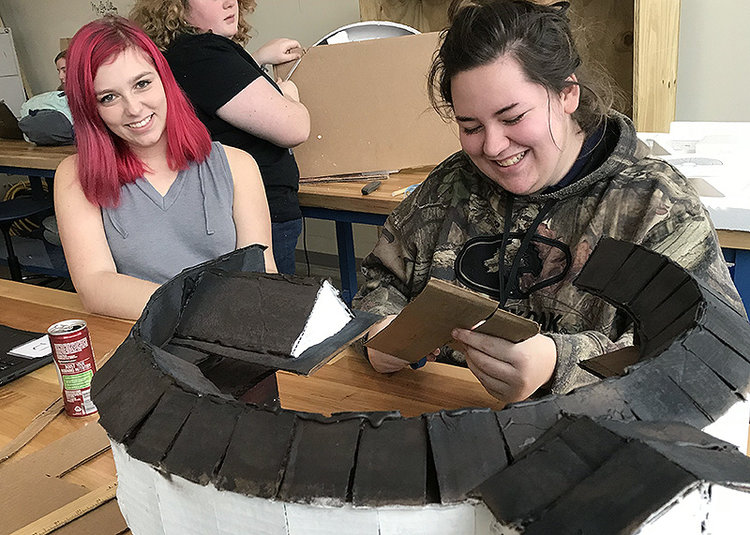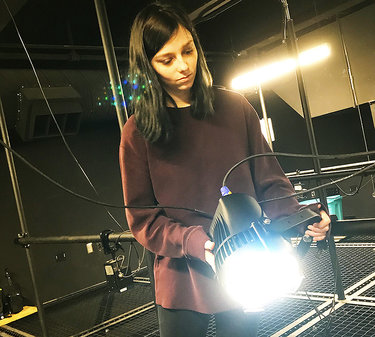Dell’Acqua loves theater, onstage and behind the scenes
GUILDERLAND — Samantha Dell’Acqua, a senior at Guilderland High School, hopes to become a professional actor in the theater. Her high-school career has involved not only a lot of performing, but also a lot of experience building sets and learning about the behind-the-scenes work of putting on a play.
Dell’Acqua, 17, was nominated this year as a Presidential Scholar by the New York State Education Department, along with 24 other students from throughout the state.
The list of Presidential Scholars selected nationwide from among the nominees comes out in May.
Dell’Acqua was recognized as a student in the Career and Technical Education program, a category that was added to the Presidential Scholar program a few years ago.
The federal program — which offers recognition, not scholarships — was started by President Lyndon Johnson by executive order in 1964. In 1979, it was expanded to recognize students with exceptional talent in the arts. In 2015, President Barack Obama expanded it further to recognize excellence among students in Career and Technical Education programs, like Dell’Acqua.
About 160 students are selected as Presidential Scholars nationwide every year.
Skilled onstage and off
For four years, Dell’Acqua has been part of the cast of the Guilderland Players’ musicals. She has acted in the high school’s dramatic fall play for the past three years. In her freshman year, she auditioned for the fall play but was not selected for the cast; she joined the stage crew that first year, helping to build sets, which she said was “really fun.”
In the spring musical “Les Misérables,” which will run this year from March 14 through 17, Dell’Acqua is an ensemble member. She is “kind of in the background, a lot of different small roles,” she said.
In the fall of 2017, she played Glory in “Almost, Maine,” a series of nine short plays on the theme of love, all set in the fictional northern Maine town of Almost.
A year later, she also built sets for a Mohonasen performance of the same play as part of her studies in the Career and Technical Education program that takes her to the Center for Advanced Technology building on the Mohonasen campus. “It was really interesting to see it from both sides,” she said of having worked on the same play — in two different places — as part of the cast and part of the crew.
When working on the sets for a play, Dell’Acqua said, the students in the CTE program do make a cut list, cutting wood for the sets and building flats — like a skyline or whatever scenery is needed — and then stretch huge canvases over the flats, and paint the canvases. For the designs, she said, each student first sketched out his or her own ideas, and then the students “melded all the ideas together.”
Dell’Acqua explained why she loves the theater. “I think it’s amazing how, for two hours, somebody can be transported into a completely different world, and feel things they’ve never felt before.”
She finds every aspect of theater “very, very interesting,” she said, and she plans to major in performance in college. She has applied to both acting schools and colleges that have strong drama departments.
Teacher Jeffrey Knorr is an English teacher and has been a union stagehand for 30 years, he said. He explains that the CTE program includes, in students’ senior year, not only learning about all of the behind-the-scenes technical aspects of theater and film, but also analyzing films and plays and writing research papers.
The program Dell’Acqua is in is run by the Board of Cooperative Educational Services, or BOCES, which offers many different practical training courses for students, in areas including computers, welding, cosmetology, and culinary arts.
In theater and film technology, students also make their own films, and build a portfolio. “Everything but the kitchen sink,” Knorr said, “and we’ve got a kitchen sink over in our shop as well.”
Students are bused over to the Mohonasen campus, usually for two-and-a-half hours a day, he said, and complete their core requirements during the half-days they spend at their home schools.
Through the program, for the past two years, Dell’Acqua said, she has also gotten to “watch the ‘tech-ing’ of a national show that was going to be performed at Proctors Theatre” in Schenectady. This included, she said, taking seminars from people who work in various aspects of theater including wardrobe, lighting, set design, and production.
“It was amazing,” she said. This year, the play was “Anastasia,” and last year it was “The Color Purple,” she said.
A member of her school’s film club, Dell’Acqua is interested in film acting too, and has acted in several short films, including one that she made. But she likes the personal feeling of theater. “I love, in theater, that every performance is a different feeling. You get different audiences and different performances.
Dell’Acqua said one of her favorite actors is Barrett Wilbert Weed who plays Janis in the Broadway production of “Mean Girls.”

Presidential Scholars
Schools can recommend students to the Presidential Scholar program.
School counselor Renée Sheehan explained why Dell’Acqua was one of the students whose names she put forward. “She’s just exceptional. She’s creative, she’s smart, she’s hard-working, she’s curious,” Sheehan said.
But perhaps her most important quality, Sheehan added, is her ability to listen respectfully to people with views that are different than her own. “She’s thoughtful, she’s kind,” the counselor said.
From among all the students put forward in their election districts, legislators then choose just two names to submit to the New York State Education Department.
Assemblywoman Patricia Fahy told The Enterprise that she chose one student from Guilderland — Dell’Acqua — and another, a young man, from Albany High School.
Fahy said that those two schools were the only ones in her district that took part in the call for recommendations of students and she wishes more schools would take part.
Fahy said she deliberately chose one male and one female. She also made sure, she said, to have one of her picks come from the Academic and Arts track and the other, Dell’Acqua, from the Career and Technical Education track.
She nominates one student in the CTE track year, Fahy said, because she thinks it’s wonderful that the state and the federal governments both “recognize that not everybody’s going a traditional high-school route.”
The decision to include CTE students was, Fahy said, “a recognition that you can excel in multiple ways.”
Of the process of choosing students, Fahy said, “We had a wealth of very distinguished students, so it was a little difficult.”
Of the two that Fahy recommended, only Dell’Acqua was chosen by the State Education Department in December, Fahy said, when it announced its 25 nominees from around the state.
The list of national semifinalists will be announced by the White House Commission on Presidential Scholars in April, and Presidential Scholars will be announced in May.
Each will receive an expense-paid trip to Washington, D.C. in June and be presented with the U.S. Presidential Scholars medallion at a ceremony sponsored by the White House. During their visit to the nation’s capital, Presidential Scholars have access to national and international figures including government officials, educators, authors, musicians, and scientists and also meet other outstanding students from around the country.
“Just the fact they’re nominated,” Fahy said, “is something they can use in their résumés.”


